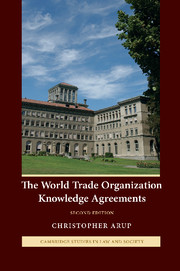Book contents
1 - Trade law as a global mediator
Published online by Cambridge University Press: 23 February 2010
Summary
This first chapter identifies the subject matter of the book and charts its course. As the book is situated in a large and often hazardous field, I am sure it would be useful to make clear what it hopes to achieve. Here, I introduce the ideas that I wish to pursue, and indicate the purposes which the book might serve.
My primary objective is to examine the texts and assess the impact of the World Trade Organization (WTO), largely through the medium of two of its new multilateral agreements. The agreements in focus here are the General Agreement on Trade in Services (GATS) and the Agreement on Trade-Related Aspects of Intellectual Property Rights (TRIPs). In so doing, I should like the book to serve as a useful resource for any student of the WTO. Therefore, a solid component of the book is given over to what I hope will be regarded as a careful analysis of the norms and processes of the organisation, using these two most innovative agreements to illustrate how its reach has been extended significantly.
The two agreements were struck when the Uruguay Round reached a conclusion late in 1993. Much of their early analysis was provided by specialists in trade policy, working within the context of the transition from the General Agreement on Tariffs and Trade (GATT) to the WTO. Their perspective was often one of neo-classical economics and consumer welfare. Another established approach, found for example in international relations, began to focus on the WTO and its new regimes, thinking particularly in terms of their impact on state power and specifically, of national sovereignty.
- Type
- Chapter
- Information
- The World Trade Organization Knowledge Agreements , pp. 3 - 21Publisher: Cambridge University PressPrint publication year: 2008

